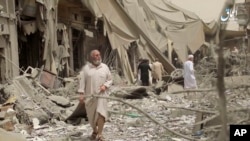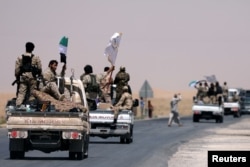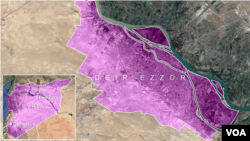A Senior United Nations official says intense fighting in Syria and bureaucratic red tape are impeding the delivery of desperately needed humanitarian assistance to hundreds of thousands of people trapped in besieged areas.
U.N. Special Envoy for Syria Jan Egeland says the United Nations has been unable to deliver food, medicine and other essential items to some 600,000 people in 12 besieged areas for the past 40 days. He says it also is extremely difficult to reach millions of others in so-called hard-to-reach areas.
He says the situation is being made even more difficult due to three very worrying developments connected to war. He says tens of thousands of civilians are trapped in Raqqa, where a ferocious battle to retake the city from Islamic State militants is being waged.
“The attacking forces are now closing in on Raqqa city," he said. "There is intense bombardment from the air and it is very hard for civilians to get out of Raqqa. There are reports that air attacks cause civilian casualties and that it has made it hard for civilians to flee.”
Egeland adds that ruthless tactics by IS militants also are preventing civilians from leaving. At the same time, he says increased airstrikes on the southern city of Daara are preventing aid from reaching civilians there.
Another obstacle to the delivery of humanitarian assistance, he says, is a dangerous outbreak of polio in the city of Deir Ezzor, which is surrounded by IS fighters.
He says efforts are underway to bring polio vaccines into the city so that a mass immunization campaign to stop the spread of the crippling disease can begin.
Egeland says the U.N. has trucks ready, warehouses full of relief items, and courageous humanitarian workers ready to deliver aid to women, children and men. Unfortunately, he says bureaucratic impediments, lack of permits, and infighting among groups are preventing the aid operation from going ahead.







